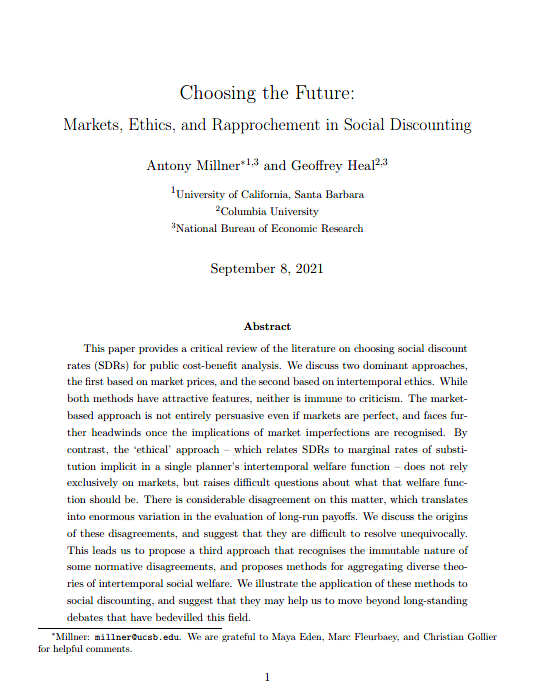Choosing the future: Markets, ethics and rapprochement in social discounting
Antony Millner (University of California, Santa Barbara and National Bureau of Economic Research) and Geoffrey Heal (Columbia University and National Bureau of Economic Research)
GPI Working Paper No. 13-2021, published in Journal of Economics Literature
This paper provides a critical review of the literature on choosing social discount rates (SDRs) for public cost-benefit analysis. We discuss two dominant approaches, the first based on market prices, and the second based on intertemporal ethics. While both methods have attractive features, neither is immune to criticism. The market-based approach is not entirely persuasive even if markets are perfect, and faces further headwinds once the implications of market imperfections are recognised. By contrast, the ‘ethical’ approach – which relates SDRs to marginal rates of substitution implicit in a single planner’s intertemporal welfare function – does not rely exclusively on markets, but raises difficult questions about what that welfare function should be. There is considerable disagreement on this matter, which translates into enormous variation in the evaluation of long-run payoffs. We discuss the origins of these disagreements, and suggest that they are difficult to resolve unequivocally. This leads us to propose a third approach that recognises the immutable nature of some normative disagreements, and proposes methods for aggregating diverse theories of intertemporal social welfare. We illustrate the application of these methods to social discounting, and suggest that they may help us to move beyond long-standing debates that have bedevilled this field.
Other working papers
How should risk and ambiguity affect our charitable giving? – Lara Buchak (Princeton University)
Suppose we want to do the most good we can with a particular sum of money, but we cannot be certain of the consequences of different ways of making use of it. This paper explores how our attitudes towards risk and ambiguity bear on what we should do. It shows that risk-avoidance and ambiguity-aversion can each provide good reason to divide our money between various charitable organizations rather than to give it all to the most promising one…
Shutdownable Agents through POST-Agency – Elliott Thornley (Global Priorities Institute, University of Oxford)
Many fear that future artificial agents will resist shutdown. I present an idea – the POST-Agents Proposal – for ensuring that doesn’t happen. I propose that we train agents to satisfy Preferences Only Between Same-Length Trajectories (POST). I then prove that POST – together with other conditions – implies Neutrality+: the agent maximizes expected utility, ignoring the probability distribution over trajectory-lengths. I argue that Neutrality+ keeps agents shutdownable and allows them to be useful.
How to resist the Fading Qualia Argument – Andreas Mogensen (Global Priorities Institute, University of Oxford)
The Fading Qualia Argument is perhaps the strongest argument supporting the view that in order for a system to be conscious, it does not need to be made of anything in particular, so long as its internal parts have the right causal relations to each other and to the system’s inputs and outputs. I show how the argument can be resisted given two key assumptions: that consciousness is associated with vagueness at its boundaries and that conscious neural activity has a particular kind of holistic structure. …

